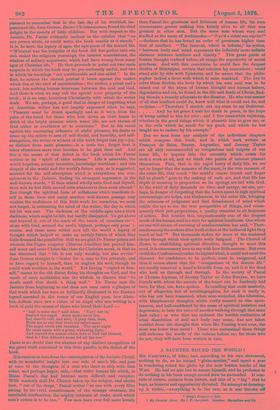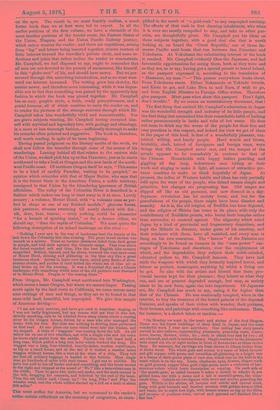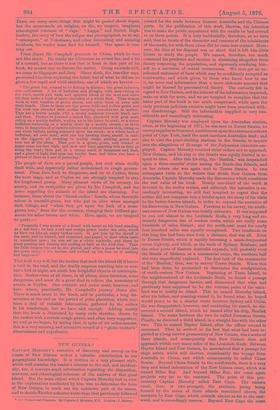A SAUNTER ROUND THE WORLD4 MR. CAMPBELL, of Islay, had,
according to his own statement, nothing to do, so he turned "globe-trotter," and spent a year in wandering round the globe by the now beaten tracks of the West. He had no aim but to amuse himself, and he professes to do nothing in his book except record how he succeeded. It con- sists of letters, extracts from letters, and bits of a "log" that he kept, as humour and opportunity dictated. No attempt at dressing- up is visible,—everything is in the raw, as it was thrown off
* Greg's Enigmas of Life.
t My Circular Notes. By J. F. Campbell. London : Macmillan and Co. " Nothing I ever saw in the way of landscape beat the beauty of the sail down the Columbia this fine evening. The great broad stream was smooth as a mirror. Trees at various distances faded from dark green to purple, and told dark against the Cascade range. That rose above the forest rounded soft and blue, like the best English lake scenery magnified. Behind, beyond, and far above, towered the vast snow-cone of Mount Hood, shining and glittering in the blue sky like a great luminous cloud. Across it, layer over layer, sailed grey flocks of cirro- stratus clouds, and parties of cirri dotted the whole sea of blue air as they broke up for the evening. It was a Ruysdael sky, and a Claude landscape, with something which none of the old painters ever dreamed of in Mount Hood. Oregon is the coming State."
From Oregon, Mr. Campbell went northward into Washington, which seems a lesser Oregon, but where we cannot linger. Passing south again by the land route to California, we come across many neat etchings of men and things, as they are to be found in that semi-wild land, beautiful, but unpeopled. We give this sample of American driving :—
"I am not very nervous, and have got used to American staging, so I was not badly frightened, but my reason told me that it was not, strictly speaking, safe to be whirled down steep places above a roaring river by six Oregon horses, driven by a man who also managed the brake with his foot. But that was nothing to driving feats performed on that road. At one place our near wheel went into the bushes, and we stopped. A train of 'waggons' was coming down the hill. An old fellow sat on one of two wheelers. aod with a single rein and his voice he drove eight mules from the [riddle. Further, his left hand held a long rope, which pulled a long iron lever which worked the drag. His waggon was a long, four-wheeled, heavily-laden, wooden contrivance, as big as a small house, and at the tail of it trailed a smaller laden waggon without horses, like a boat at the stern of a ship. They tell me that all military baggage is hauled in this fashion. Here single men go hundreds of miles with such teams. I got one to exhibit. He gave one pull to his off leader and said something, and the brute turned • to the right and stopped at the sound of 'Wo!' like a benevolent man in the riddle. Then he gave two jerks and spoke, and the mule turned to the left, dragging his comrade, and followed by the rest of the team. Then the old fellow said, 'Come up!' ' Go long, Pike and Pike the wheeler went, and the whole edifice started up a hill on a trail of about 200 miles."
This must suffice for America, but we commend to the reader's notice certain reflections on the economy of emigration, as exem- -on the spot. The result is, we must frankly confess, a much better book than we at first were led to expect. In all the earlier portions of the first volume, we have a chronicle of the most familiar portions of the tourist route, the Eastern States of the Union, Niagara, and the Union Pacific Railway journey, which rather wearies the reader ; and there are repetitions, arising from "log" and letters being inserted together, minute matters of little interest beyond the traveller's private circle, and some re- flections and jokes that rather incline the reader to remonstrate.
Mr. Campbell, we feel disposed to say, ought to remember that all men are not devoted to the pursuit of amusement, like himself, in this "globe-trot" of his, and should have mercy. But we per- severed through this uninviting introduction, and as we went west- ward our interest increased. The writing grew less sketchy, the matter newer, and therefore more interesting, while it was impos- sible not to feel that something was gained by the apparently lazy fashion in which the book was pieced together. Mr. Campbell has an easy, graphic style, a fresh, ready perceptiveness, and a genial humour, all of which combine to carry the reader on, and to render the pictures of the strange societies through which Mr. Campbell takes him wonderfully vivid and rememberable. Nor are grave subjects wanting, Mr. Campbell having occupied him- self with mythical and legendary lore, with geology and ethnology, in a more or less thorough fashion,—sufficiently thorough to make his remarks often pointed and suggestive. The book is, therefore, well worth reading, in spite of its tame beginning.
Having passed judgment on the literary merits of the work, we shall now follow the traveller through some of the scenes of his wanderings. Leaving behind all that relates to the eastern side of the Union, we shall pick him up at San Francisco, just as he starts northward to take a look at Oregon and the new lands of the north-
west Pacific coast. Of northern Oregon itself he says, "This seems to be a kind of earthly Paradise, waiting to be peopled," an opinion which coincides with that of Major Butler, who says that it is the fairest State in the American Union, a noble territory, consigned to that Union by the blundering ignorance of British officialism. The valley of the Columbia River is described in a fashion which makes one long to start away to it at once. Lovely scenery ; a volcano, Mount Hood, with "a volcanic cone as per- fect in shape as one of my finished models ;" glorious forest, rich pastures, streams swarming till nearly choked with fish ; elk, deer, bear, beaver, — truly nothing could be pleasanter "for a hermit of sporting tastes," or for a farmer either, we should say, "than the rapids of Columbia." We must quote the following description of an inland landscape on this river :— plified in the result of "a gold-rush" to any unpeopled territory. IThe effects of that rush in first drawing inhabitants, who when
it is over are mostly compelled to stay, and take to other pur- 1 suits, are thoughtfully given. Mr. Campbell put his ideas on these subjects together, with a good deal else that is worth looking at, on board the 'Great Republic,' one of those im- mense Pacific mail-boats that run between San Francisco and Yokohama. At Yokohama the culminating interest of the book is reached. Mr. Campbell evidently likes the Japanese, and had favourable opportunities for seeing them, both as they were and as they are, so to say, having got a special permit to travel inland, as the passport expressed it, according to the translation of " Massanao, my man :"—" This person everywhere looks about. From Yokohama starts. Either Nakasendo or Tokiado travels, and Kioto to get, and Lake Biva to and Nara, if wish to go, and from English Minister to Foreign Office writes. Therefore give passport. Must pass when show this passport. Don't fight, don't trouble." By no means an unsatisfactory document, that ! The first thing that excited Mr. Campbell's admiration in Japan was the wonderful strength and industry of its little people, and the first thing that astonished him their remarkable habit of bathing rather promiscuously in baths and tubs of hot water. He does not seem to think any the worse of the people for their free and easy practices in this respect, and indeed the view we get of them in the pages of this book is that of a wonderfully pleasant, con- tented, willing, and handy people. Hard words and blows, brutality, sloth, hatred of foreigners and foreign ways, were things that Mr. Campbell never met, and the temper of the people appears to be remarkably in contrast to that of the Chinese. Households with happy babies prattling and giggling all day long, industrious men toiling at their work and singing to make it light, all manner of attractive pic- tures combine to make us think hopefully of Japan. At present, the influx of Western habits and ideas has only partially told upon the ways of the people, who inland remain simple and primitive, but changes are progressing fast. Old usages are slipped off like an old garment, and new donned in a day. Japanese revolution has let society loose, and but for the peacefulness of the people, there might have been disaster and anarchy. As it is, the old religion of Buddha has been deposed,
and the religion of Shinto has come in its place, with only the recalcitrancy of Buddhist priests, who burnt their temples rather than surrender, to contend against. The oligarchy which ruled Japan by a kind of provincial and fragmentary despotism, and kept the Mikado in durance, under guise of his sanctity, and
their retainers with them, have all vanished, and every man is flung on his own resources. The " braves " of the Daimios are accordingly to be found as runners in the " man-power " car- riages of Yokohama and elsewhere, over the employment of which, and the degradation they subject their noble-minded, educated pullers to, Mr. Campbell laments. They have laid aside the weapons with which they formerly inspired terror, and labour as porters, messengers, anything by which a living can be got. So also with the artists and literati that these pro- vincial barons kept for their pleasure ; they labour at what they can, and are at present degraded enough, but may, as society
takes to its new form, again rise into importance. Of Japanese art, Mr. Campbell has much to say, rating it far higher than
that of the Chinese. He was continually tempted, when in the interior, to buy the treasures of the looted palaces of the deposed Daimios, and speaks of their riches with wonder, their pictures, their bronzes, and paintings with something like enthusiasm. Here, for instance, is a sketch taken at random :—
"On Monday we went to the tomb and shrine of the first Shogun. These are the finest buildings of their kind in Japan, and the most wonderful work I ever saw anywhere. One railing has sixty panels carved in alto-relievo, representing pheasants, peacocks, coots, cranes, trees, leaves, flowers, rocks, ecc.; each is about four feet by two ; all are coloured, and each is extraordinary. Single feathers in the pheasants' tails stand out six or eight inches in front of flowers two or three inches deep. By measure, the carvings are from eleven to fifteen inches deep, of hiako wood. The whole gate and screen is a mass of black lacquer and gilt copper, with green and vermilion all glittering in a bright sun in a frame of dark-green pines of vast size, which rise on the hills to the tomb which is on the top. Lions, elephants, apes, flowers, diaper-work on gold ground, copper tiles, gold ridge-poles, make a confusion of har- monious colour which beats description or copying. On each side of the month-gate,' so called because it takes a month to admire it, are gilded lions, one with a mane and a tail of emerald-green, the other smalt-blue. Outside sit two figures with bows and arrows guarding the gate. Within is the shrine, all lacquer and colour and carved wood, hung with gold brocade and bamboo screens, with golden-bronze lilies and vases, six to eight feet high, with bronze cranes as big as the lilies, and screens of precious wood, carved and painted an-1 finished like a fine box."
There are many more things that might be quoted about Japan, but the memoranda on religion, on the, we suspect, imaginary ethnological relations of " Japs," "Lapps," and Scotch High- landers, the story of how the eclipse was photographed, so to say, "extempore," at Yokohama, and other interesting and amusing incidents, the reader must find for himself. Our space is run- ning out.
From Japan Mr. Campbell proceeds to China, which he does not like much. Ile thinks the Chinaman an arrant liar, and a bit of a coward, but as there is less that is fresh in this part of his book, we cannot stay to discuss the matter. Going onwards still, we come to Singapore and Java. Sheer sloth, the traveller says, prevented him from exploring the latter, but of what he did see he gives a few rapid and vivid sketches, one of which we borrow :—
" The great fun seemed to be fishing in ditches ; the great industry, rice cultivation. A lot of buffaloes and ploughs, with men sitting on the wood, march and wade and splutter about in the mud and water till they make a kind of nasty chocolate of a whole field. Then women wade in with bundles of green plants, and stick them in rows with their hands. Close to them are ripe green fields and yellow grain, and the road was crowded with coolies carrying rice-sheaves to market. They are a brown people, wfth a strong tendency towards black now and then. Picture to yourself a naked boy, plastered with grey mud, riding on a muddy buffalo, wading up to his knees in mud ; or a dozen buffaloes wallowing on a muddy shore by a muddy stream ; or three boys, in draperies of primitive colours and natural brown skin riding on one white buffalo, pacing solemnly down the street; or a whole herd of buffaloes, all over mud, with one boy herding them, seated in state on the biggest, all standing in muddy water, picking green pas- ture out st the slime. Then put in a groat, green, cool thicket of sugar-cane, ten feet high, and men and boys gnawing bits as they go along the road ; then put in a strong smell of dampness and heat, and a glare of light that eyes can hardly bear, and there you have a picture of Java as I saw it yesterday."
The people of Java are a proud people, but civil when civilly dealt with, and apparently rather accustomed to rough govern- ment. From Java back to Singapore, and on to Ceylon, forms the next stage, and at Ceylon we are strongly tempted to stay for lengthened gossip. Many pleasant views of its scenery, its society, and its antiquities are given by Mr. Campbell, and the notes regarding the animals of the island are charming. For instance, those about the "blood-sucker" lizards, whose favourite colour is emerald-green, but who put on olive when amongst dark foliage, and "when they get upon the bark of a moss- grown tree," dress for the occasion, changing their brilliant gar- ments for sober brown and white. Here, again, we are tempted to quote Presently I was aware of a lizard with horns on his head standing on a tall tree ; he had a red and orange pouch under his chin, which he blew out like an angry turkey-cock. G. got him by the skraff of the neck, and he kicked, and scratched, and gaped, to show white teeth in vermilion jaws • he was set on a white umbrella, and there he stood panting and fuming and puffing as bold as the Evil One. Then the little dragon was set on the gravel, and after a pause he went into the grass amon2st the leeches, and walked up his tree as if nothing had happened."
That is all very well, but the leeches that suck the blood till it leaves a trail in the road, and the deadly serpents crawling into or over one's bed at night, are much less delightful objects of contempla- tion. Snakes come at all times, in all places, some harmless, some dangerous, and must do a great deal to relieve the monotony of events in Ceylon. Our extracts and notes must, however, end here, where, practically, Mr. Campbell's journey closes also. There is much more in the book, and in particular, a long dis- sertation at the end on the period of polar glaciation, which con- tains a deal of valuable information, gathered by the author In his wanderings, but we have said enough. Adding merely that the book is illustrated by many rude sketches, drawn by- the author with a certain rough power, and often very suggestive, we end as we began, by saying that, in spite of its redundancies, this is a very amusing and attractive record of a "globe-trotter's" observations and experiences.
































 Previous page
Previous page